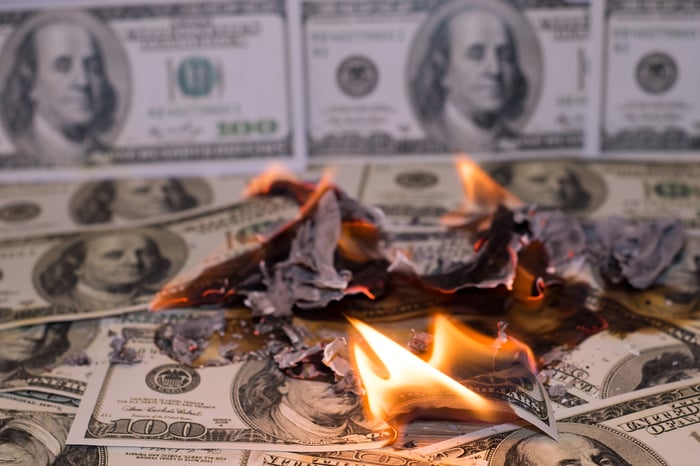Whether you're a relatively new investor or someone who's been putting your money to work in the market for five decades, there's always something new or unforeseen happening that keeps things interesting.
In 2021, it's been the rise of the Reddit trader.

Image source: Getty Images.
Beginning in mid-January, retail investors -- mostly millennials who are relatively new to investing -- on Reddit's WallStreetBets (WSB) community chatroom began banding together to buy shares and out-of-the-money call options in highly short-sold stocks. Short-sellers are investors who are betting against a stock and hoping for its share price to decline. Since gains are capped at 100% while losses are unlimited, short-sellers tend not to stick around if a stock begins to gain a lot of upside momentum.
Reddit's WSB community was able to effect short squeezes in dozens of short-sold stocks. In order for short-sellers to exit their positions, they must buy to cover. Buying stock only exacerbates the runaway train effect to the upside.
Since mid-January, movie theater chain AMC Entertainment (AMC 0.25%), video game and accessories retailer GameStop (GME -2.09%), and Canadian marijuana stock Sundial Growers (SNDL 2.87%) have been the three most-popular plays of Reddit's retail investors. Unfortunately, they're also three of the worst stocks money can buy.

Image source: Getty Images.
Here's why it could be lights-out for AMC
AMC's popularity has to do with its perceived-to-be low share price, as well as the reopening of 99% of its theaters by March 26, according to the company. As many folks have also pointed out to me on social media, technical analysis (i.e., chart patterns) is also driving interest.
However, none of these catalysts offers true substance.
For instance, AMC Entertainment was on the verge of bankruptcy in mid-January, and was ultimately saved by issuing close to 165 million new shares of stock and taking on over $400 million in debt capital. The company may have more than $1 billion in cash on hand now, but it's facing aggregate operating losses over the next two years that, by Wall Street's consensus, will come in around a median of $1.7 billion. This is a fancy way of saying that AMC Entertainment almost certainly doesn't have enough cash to make it through the next 12-to-24 months, based on projected losses.
Another thing to keep in mind is that AMC's theaters reopening doesn't mean things are back to normal. A vast majority of its theaters will be operating at limited capacity, and there's always the possibility that coronavirus variants lead to certain cities, counties, or states scaling back their reopening plans.
But maybe the biggest slap in the face for shareholders is that AMC executives pocketed $8.3 million in bonuses just a month after stepping back from the bankruptcy ledge for their "extraordinary efforts" to keep AMC afloat during these challenging times.
If you still need one more damning reason to avoid AMC like the plague, here it is: The model is being disrupted. Both AT&T's WarnerMedia and Walt Disney are releasing new movies in 2021 on their respective streaming platforms (HBO Max and Disney+) the same day they'll hit theaters. The growth heyday for movie chains is over, and so are AMC's chances for success, in my view.

Image source: Getty Images.
Game over for GameStop?
Even though it's the stock that began the Reddit frenzy, GameStop is not a company that any investors should desire to own at its current valuation.
The primary buy thesis for GameStop has been its high level of short interest. When the short squeeze began in mid-January, the company's short interest, relative to float, was by far the highest on Wall Street. It's come down substantially since then, but GameStop's share price has not.
If I could grasp at straws and perhaps find one shred of good news to share, it's that the company's e-commerce sales have been soaring of late. During the 2020 holiday season, digital gaming sales rose by 309%. But here's the kicker: Even with a more-than-quadrupling in e-commerce sales, total sales during the holiday season still declined by 3.1%. That's primarily because GameStop shuttered 11% of its stores between the 2019 and 2020 holiday seasons.
The plain-as-day issue here is that GameStop waited far too long to shift its operating focus to digital gaming. With fewer people trading in or buying used games, which used to be GameStop's high-margin, bread-and-butter growth driver, GameStop's only recourse is to attempt to backpedal its way back into the profit column. This means closing hundreds of stores annually to reduce expenses. But in spite of these precipitous closures, GameStop is likely looking at its fourth-consecutive annual loss in 2021.
While it may not be game over for GameStop, the company's glory days are long gone. Its market cap today is roughly two times higher than its previous all-time high set back in 2007. The thing is, revenue has gone nowhere, and the company has pushed from recurring profits to ongoing losses. There's no way to logically justify this valuation.

Image source: Getty Images.
Sundial might go up in smoke
Finally, there's Sundial Growers, which I believe is the worst marijuana stock money can buy.
Similar to GameStop and AMC, Sundial has been buoyed by the Reddit crowd for its high short interest and the lure of its penny stock share price. Canadian pot stocks have also received a boost following the election of Joe Biden as President and Democrats retaking the Senate by the slimmest of majorities. There's hope that cannabis legalization in the U.S. would allow Canadian players like Sundial to enter the more lucrative U.S. market.
But if there's one thing tenured investors are acutely familiar with, it's that next-big-thing investments always have losers. Sundial looks like one of those losing investment.
To begin with, Sundial just might be the worst share-based diluter I've seen in years. Since the end of September, Sundial has boosted its cash on hand to $719 million Canadian, but has done so by issuing more than 1.15 billion shares (yes, with a 'b') through a combination of direct share offerings, debt-to-equity swaps, and at-the-market issuances. Were this not enough, its board approved another $1 billion (that's U.S.) mixed-shelf offering. In theory, Sundial could issue hundreds of millions of additional shares.
Because of its 1.66 billion outstanding shares, Sundial has virtually no chance of ever generating a meaningful per-share profit, and it probably runs the risk of being delisted if it falls back below $1 a share. Sundial could enact a reverse split to bump up its share price and shrink its outstanding share count, but companies that utilize reverse splits are historically viewed as struggling businesses.
What's more, Sundial isn't anywhere near profitability, and investors are paying close to $1.9 billion for it, excluding cash. That's close to 38 times sales for a company that's lagging the vast majority of its Canadian and U.S. peers.
AMC, GameStop, and Sundial might be today's buzzy stocks, but they lack substance and have little long-term staying power. That makes all three terrible buys.





